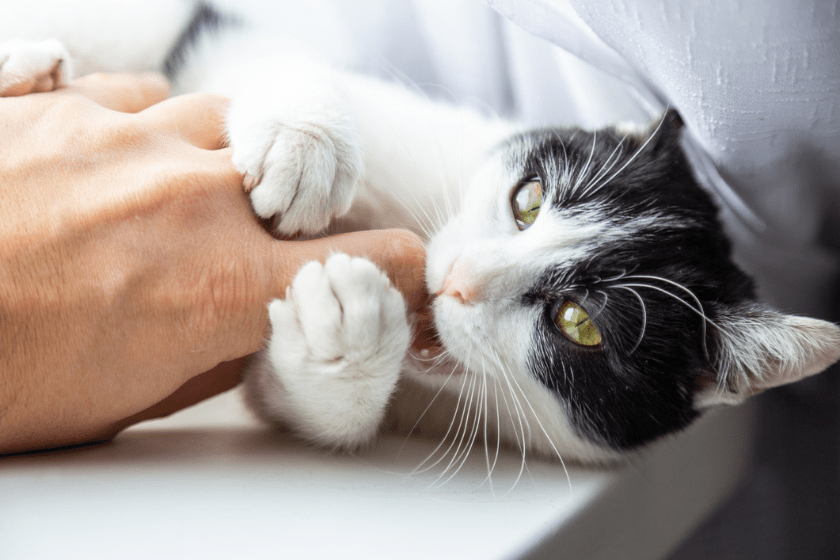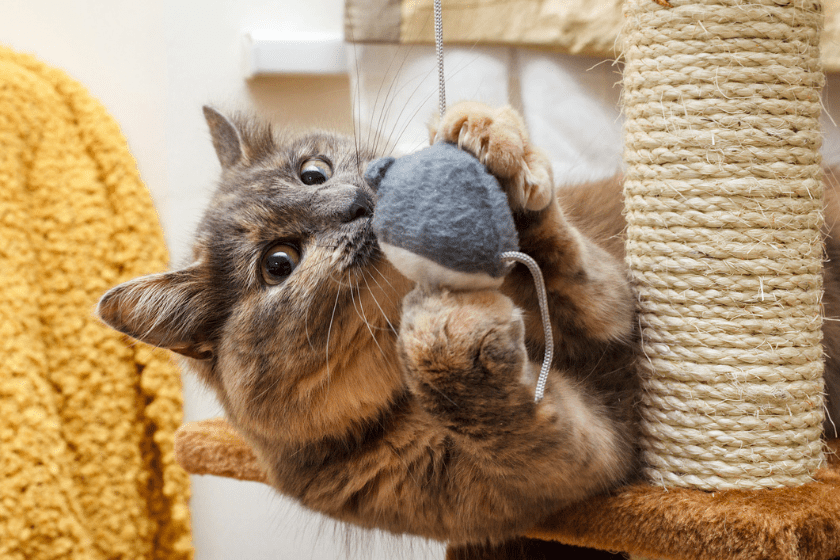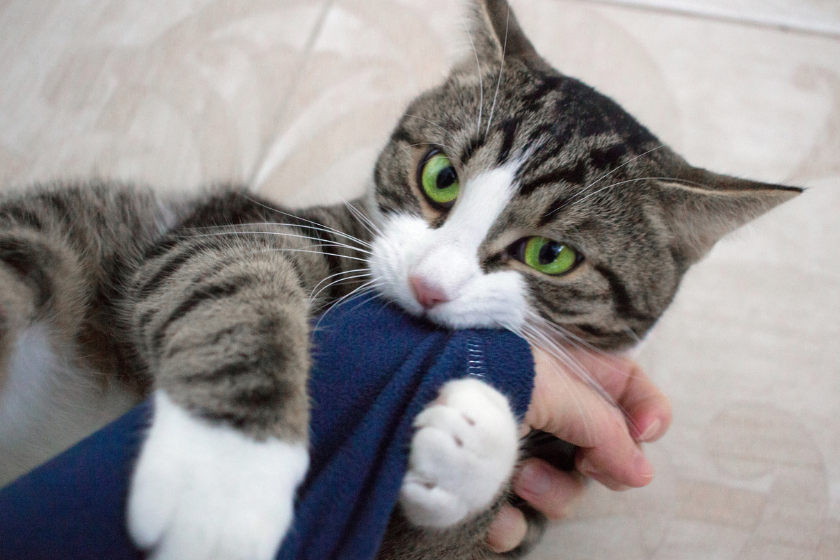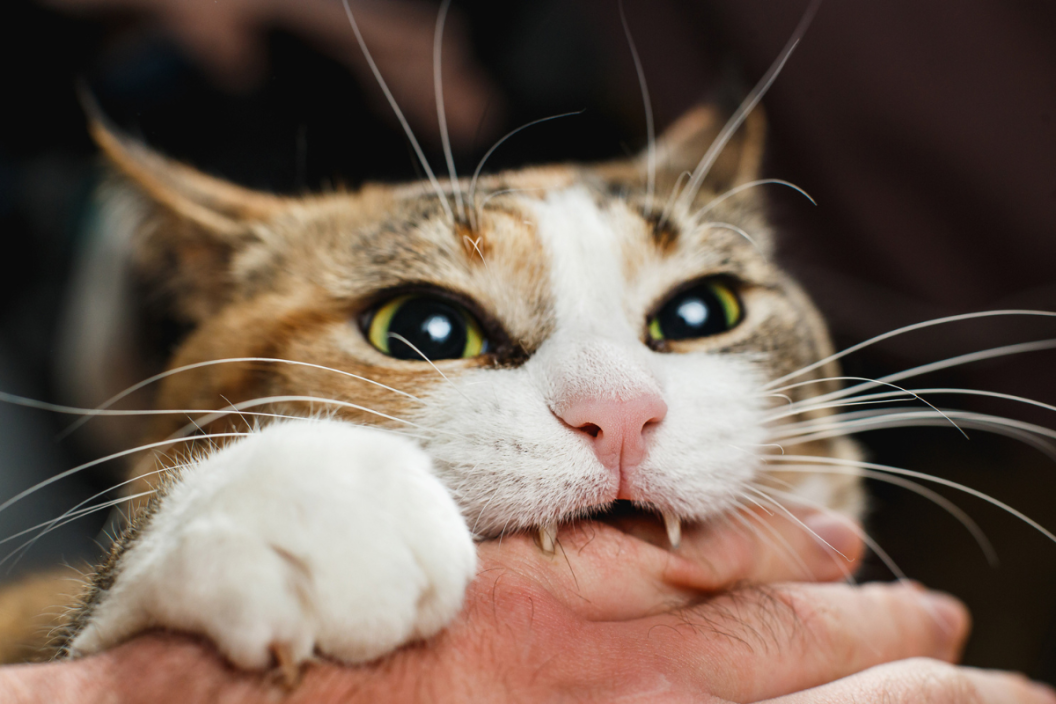Cats can go from cuddly to nuclear pretty quickly. Cat owners know that cuddles on the couch don't always end with purrs, but sometimes with pouncing, biting, and scratching. It's easy to wonder what you did wrong. Did you scratch too hard? Pet too soft? Did the little devil even give a warning sign? Sometimes, cat behavior can be a bit of a mystery. They stare at us, lick us, and do a lot of strange things. Ultimately, you might wonder, why does my cat bite me?
Cats might seem enigmatic, but just like dogs, there's usually a reason behind their odd behavior. While cats sometimes bite just to be aggressive, you don't have to worry about sleeping with one eye open—there are plenty of other reasons why cats might turn into t-rexes when you're just trying to enjoy a nice petting session on the couch.
1. Love Bites

Believe it or not, a gentle bite can be a sign of affection. It is also a way for your cat to communicate with you. For example, if you have stopped playing or petting your cat, a gentle nip is their way of telling you that they want you to continue. Some cats will merely bump you with their heads, much like dogs, but others think a nip or two will be more likely to get the reaction they are looking for.
However, if you resume petting them, your cat will resort to using nipping as a way to get attention. Instead of rewarding the bad behavior, redirect your cat's attention or simply walk away. Resume petting them when they are sitting calmly.
2. Playtime

During playtime, cats can get a little rambunctious and begin clawing at their toys or at you. Often, they are not being an aggressive cat—it's just how they play, especially if they're still a kitten. Granted, if you encourage that aggressive behavior in kittens, it can carry over into adult cats. A common reason for aggressive biting during play is that the cat was taken from its mother too early.
The mother cat and their siblings teach them what is and is not acceptable during play. Then, they will go all out with their claws and teeth, seeing how far their kitty family members will let them go with nipping and nibbling before they get shut down.
Kittens that have not had that experience will transfer the impulse to their human parents, which means you will have to teach your cat what is and is not appropriate behavior for play. If it is just a gentle bite, try not to react and walk away. Your cat will learn that you do not respond to the behavior. Avoid rough play with young kittens, so they do not think that type of behavior is acceptable in the long run.
Also, try to use toys in place of your hands for playtime. That will encourage appropriate cat behavior. If you have an indoor cat, their play aggression may be from boredom or frustration. Set up a routine with regular play sessions to keep them stimulated. Give them toys that they can pounce on, and remember to rotate their toys frequently. It doesn't hurt to tire them out, either!
3. Pain or Fear

Aggressive behavior can present itself when your cat is feeling afraid. Much like when they meet a new pet or head to the vet, other scary situations can bring out your cat's teeth and claws. If heading to the vet brings out the aggressive bite in your cat, you can get them more comfortable with their carrier or car rides by giving them treats and making it very cozy.
If biting is something new to your cat, it may be a sign that they need a little extra pet care. For example, their paw could be hurt, or they can have an injury elsewhere on their bodies, which is why your attempt to cuddle may be met with a bite.
Stress is another reason for your cat to act out. This may come in the form of biting, scratching, hissing, or not using their litter box correctly. Our cat always leaves little surprises outside of the litter box when something changes, and she is not happy about it, even if it's just us moving her water bowl. Catnip can help ease your cat's stress and tension. Who doesn't want a treat that adds a little relaxation?
4. Overstimulation

Cats do not like to have too much attention. Hence overstimulation can become a huge issue. As a cat owner, it is crucial to watch your cat's body language. Often your cat's behavior will give you clues to what they want and don't want. If you see any of the following signs, it is time to leave your can alone:
- Flattened ears
- Dilated pupils
- Stiff body
- Whiskers forward
- Twitching skin or tail
They may have had too much petting, or they just need some alone time. Unfortunately, if you ignore the signs your cat is clearly giving you, you will likely get a few cat bites.
Another reason a cat could be biting is that they are teething. Make sure you provide your kitten with the appropriate chew toys to ease their teething symptoms and give them a productive outlet that is not your arm.
For more answers to your pet questions, follow our Wide Open Pets Facebook page!
This article was originally published August 26, 2021.
READ MORE: Does Your Cat Fuss During Bath Time? Check Out Waterless Shampoo for Cats




